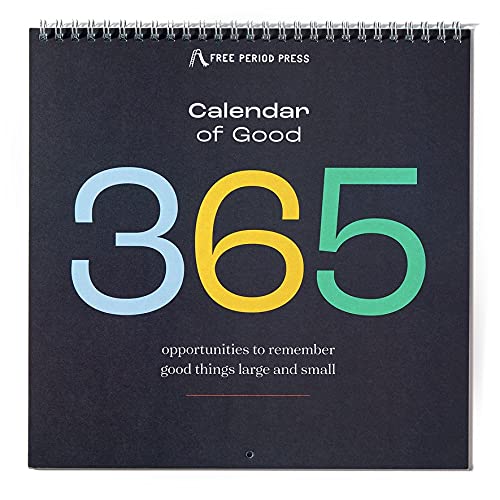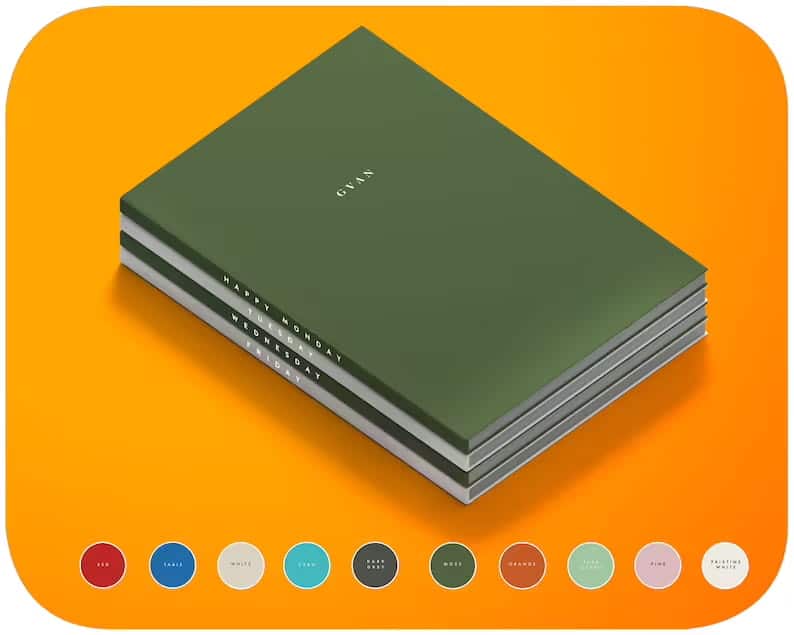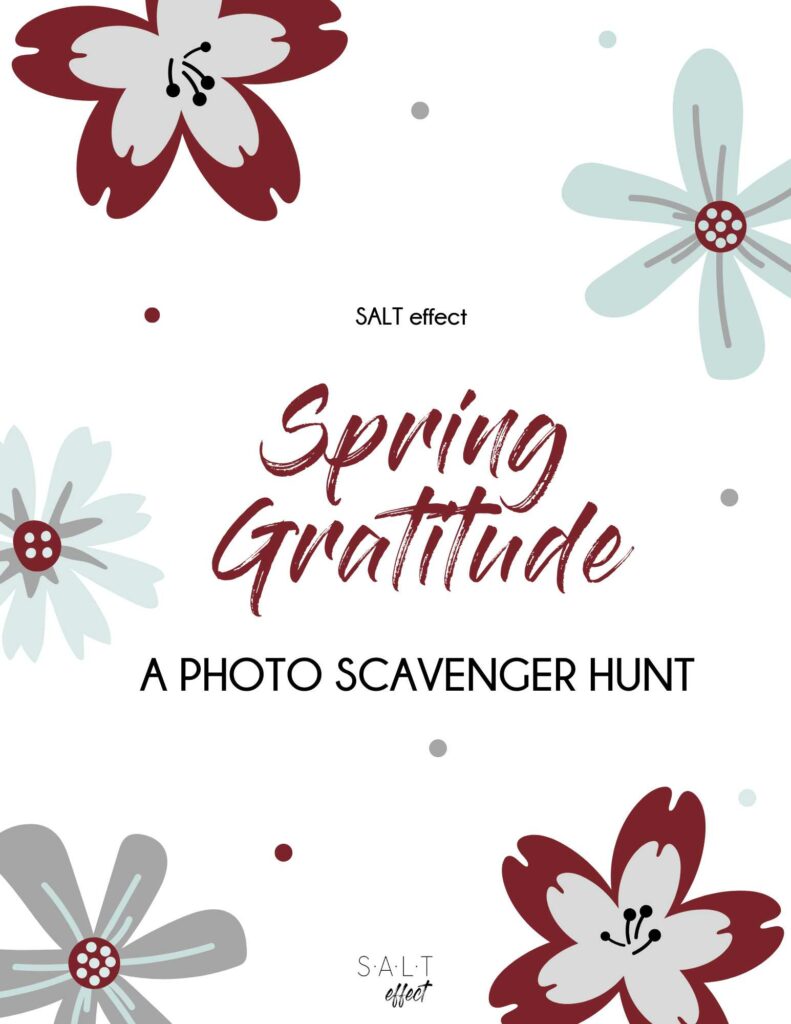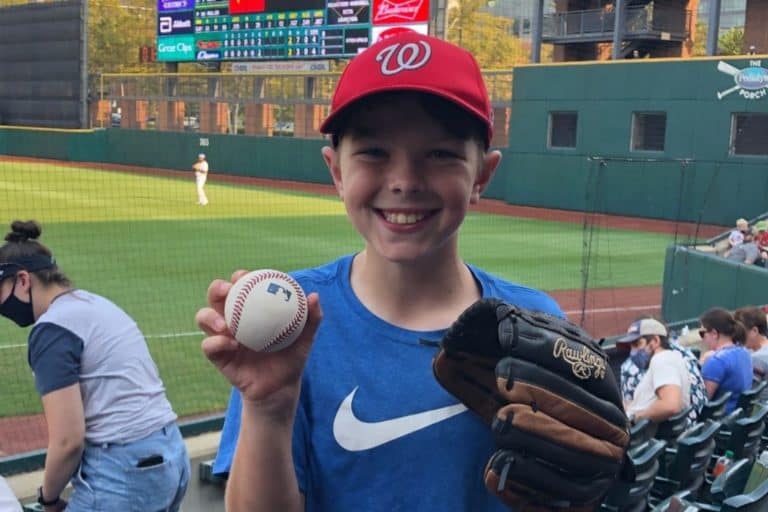365 Things To Be Grateful For: Thankful Ideas for 2024

Cultivate a year of thankfulness with unique daily prompts and inspiration. Research shows that practicing gratitude improves all areas of life, including mental and physical health. Even if you change nothing else in your life, prioritizing gratitude can change it all.
I think about, talk about and teach about gratitude every day. Thankfulness has a transformative power that stretches into every area of life.
In this article, we’ll explore how incorporating gratitude into your daily life can enhance eight dimensions of wellness. Did you know that the practice of gratitude actually changes the molecular structure of the brain?
Its power is truly unmatched. And science backs that up.
At the end of every class teach, I give my college students a different gratitude prompt and we spend time talking about the many reasons they have to be more thankful.
I emphasize that it’s more than saying “thank you” or listing a few things at Thanksgiving. It’s a mindset that takes practice and repetition to cultivate.
When we practice gratitude and make it a habit on a daily basis, it gets easier and feels more natural. And then we start reaping all the benefits of gratitude in a positive snowball effect.
So let’s take a look at various thankful ideas and activities that can help you develop a grateful mindset. From journaling to scavenger hunts to sending notes, I have plenty of suggestions to help you easily build gratitude into your routine.
Gratitude Scavenger Hunt
No matter your age, you’ll love our (free!) gratitude photo scavenger hunts. Especially if you’re looking for a fun way to be more grateful.
You could use these in a classroom, with your family or on your own. Trying to get tweens and teens to write in a daily gratitude journal is a challenge. But giving them a chance to use their cell phones for good? Yes, please!
Download our free gratitude scavenger hunt for spring, summer, fall or winter. We even have a special one for Christmas and one you can use any time of the year.

The Endless Benefits of Gratitude
One of the biggest benefits of gratitude is happiness. A study by Robert Emmons and Michael McCullough in the Journal of Personality and Social Psychology found that people who practice gratitude tend to be 25% happier!
But there’s so much more.
As I was writing this post, I found a helpful document from the Substance Abuse and Mental Health Services Administration (SAMHSA) and realized that science shows how gratitude can improve all eight dimensions of wellness.

Below you’ll find research about gratitude and each of these eight dimensions of wellness, along with gratitude list ideas.
Grab a journal, a notebook or the notes app on your phone and focus on one area at a time. Keeping a list of things in one place allows you to reflect on them anytime you need a reminder of all the great things in your life.
Focus on the big things and the small things. Make your gratitude list specific and personal so you can reap all the benefits of gratitude.
Emotional Benefits of Gratitude
The National Institutes of Health defines emotional wellness as “the ability to successfully handle life’s stresses and adapt to change and difficult times.”
Based on the research, practicing gratitude is one of the best ways to achieve emotional wellness.
Grateful people have greater levels of psychological well-being, feel more positive emotions and are more content and satisfied with life.
Ever wish you could get a better handle on negative emotions like envy, resentment, frustration and regret? Do a better job of managing stress in a healthy way? Have better self-esteem?
Or maybe these are all good things you wish for your whole family. When we express gratitude, they all improve.
And making a habit of gratitude decreases symptoms of depression and anxiety, and may help counteract suicidal thoughts.
It helps us think more positively and develop resilience so we can cope with the inevitable hard times in life.
Gratitude is a life-changing gift to give our tweens and teens.
Gratitude Prompts for Emotional Wellness
- What is one thing you love about your life right now?
- What relationship encourages you to express thoughts and feelings?
- What healthy relationship are you most grateful for?
- What challenge are you facing that you could reframe as an opportunity?
- What have you learned from a recent mistake?
- How has taking responsibility for your actions helped you grow?
- How are you able to prioritize your mental health?
- What healthy coping mechanisms are you thankful for? (journaling, music, talking)
- What is the best thing about your daily routine?
- What one thing can turn a bad day into a good one?
- What small daily moments bring you joy and happiness, no matter how simple they may be?
- When you feel discouraged, what helps you feel better?
- When you feel nervous or anxious, what helps you feel better?
- What is something you’re proud of?
- What are you looking forward to?
- What do you notice or pay attention to when you take time away from technology?
- What books, articles or other resources on emotional well-being have had a positive impact on your life?
- What apps help you manage your emotions? (Headspace, Brain.fm)
- What do you appreciate about meal times?
- What is your favorite form of self care?
- When you start to compare yourself to others, how does gratitude help you refocus?
- What positive changes have you made in your life in the last year?
- What challenge or difficulty has made you stronger?
- How is your life better when you pay attention to your emotions?
- How has practicing gratitude helped you better empathize with others and understand their emotions?
- What healthy strategy helps you manage stress?
- Who in your life is a really good listener?
- What compliment made you feel good recently?
- How do your relationships improve when you listen before you speak?
- What positive things can you find in a recent frustrating situation?
- How has an attitude of gratitude influenced your ability to forgive yourself for past mistakes and move forward?
- What personality traits are you grateful for?
- How does gratitude help your self-esteem and self-image?
- What do you love most about the way you grew up?
- How has practicing gratitude helped you manage your anger or frustration in a healthier way?
- How is your emotional wellness better now compared to a year ago?
How Gratitude Helps Our Social Lives
Healthy relationships are foundational for social wellness. Practicing gratitude can strengthen family relationships and make us more willing to help.
It can also help improve relationships that need some work—we’re more likely to trust other people and we’re better equipped to forgive.
Grateful people create community and connections, which naturally leads to a wider social network and more friends. When we practice gratitude on a regular basis, we’re more agreeable and we have more empathy, an essential ingredient for thriving communities.
And here’s a really cool finding about the power of gratitude: when we take the time to say thank you, the people we thank are twice as likely to help more people, including strangers. Our world could use a whole lot more of that!
READ MORE >>> 9 Simple Ideas for Teacher Appreciation Gifts
Gratitude Prompts for Social Wellness
- What friendship are you most thankful for?
- What specific qualities in your closest friend make them an irreplaceable part of your life?
- Who in your life always encourages you to be yourself?
- How do good friends make life better?
- Who supports you in your current stage of life?
- What do you enjoy most about your current stage of life?
- What qualities do you most admire in other people?
- Who in your life shares your values, ideas and/or priorities?
- What have you learned from friends or family members who don’t share your values, ideas and/or priorities?
- How is your life better because of people who are different from you?
- Who in your life introduces you to new people, ideas or experiences?
- How is your life better when you meet new people or try new things?
- What was your favorite thing to do with friends when you were a kid?
- Compared to other generations, what was the best part about being a kid when you were young?
- What is your favorite childhood memory?
- What is your favorite way to spend time with a friend now?
- What memory with a friend makes you laugh?
- What picture on your phone captures a favorite memory?
- What picture on your phone makes you laugh out loud?
- What do you like most about the last picture you took on your phone?
- What person in your life can always make you smile or laugh?
- What is the best thing about spending time with your family?
- What recent experience strengthened your relationship with a friend or family member?
- When something good happens in your life, who do you love to share it with?
- Who is your most reliable friend or family member?
- How has expressing gratitude to your family members improved your relationships?
- Whose forgiveness are you most grateful for?
- How is your life better when you forgive someone else?
- What great activity do you love doing with your family?
- What family tradition means the most to you?
- What important lesson have you learned from the family who raised you?
- Which friend or family member cares about you with an unconditional love?
- Who is the most dependable person in your life?
- What friend or family member is the best listener?
- How has apologizing helped you repair or rebuild trust with someone you care about?
- What do you most appreciate about deep conversation with a loved one?
- What unique experience with a family member or friend are you grateful for?
- Who supports your goals or hopes or dreams?
- Who encourages you to try new things?
- How does prioritizing your most important relationships make you a better person?
- What recent act of kindness have you received?
- What random acts of kindness have you witnessed recently?
- How does technology help you connect with family or friends?
- What apps do you use to communicate with friends or family?
- What is your favorite holiday?
- Who do you love celebrating your favorite holiday with?
- How is your social wellness better now compared to a year ago?
READ MORE >>> 117 Ideas for Volunteering With Your Family
How Gratitude Improves Our Physical Health
Knowing the positive impact that gratitude can have on our emotional and social wellness makes sense, but our physical wellness? Yes, gratitude improves our overall physical health.
The neuroscience of gratitude is fascinating! This even got the attention of my teenager who usually rolls his eyes when I talk about gratitude. (In fairness, I do it all the time so I’m sure he gets tired of it.)
Practicing gratitude can strengthen our immune system, lower blood pressure, improve heart health and help us manage pain. It also reduces the risk of substance use disorders.
Grateful people make better food choices and are more likely to exercise—take note if these are some of your goals!
People who practice gratitude also have more energy, sleep better and live longer.
Gratitude Prompts for Physical Wellness
- What is your favorite fresh fruit?
- What is your favorite fresh vegetable?
- How close is your nearest grocery store?
- What do you most appreciate about your grocery store?
- How does having easy access to fresh food positively impact your health and life?
- What is your favorite thing to buy at a farmer’s market?
- What do you love about your favorite thing to drink?
- What is the best thing about having clean water to drink?
- What is your favorite home-cooked meal?
- What do you love most about eating a home-cooked meal?
- What meal do you love to eat with your family?
- How does eating a meal with your family contribute to your emotional and physical wellness?
- What do you like to cook?
- What food makes you feel better when you’re sick?
- Why do you love certain herbs or spices?
- What is your favorite healthy recipe?
- What is your favorite beverage?
- Why are you grateful for good health?
- What do you love about your favorite restaurant?
- What is unique about places to eat in your town or city?
- What is the best thing about grocery, pizza or other food delivery?
- How does healthy food make you feel?
- What are your favorite herbs or spices?
- Why are you thankful for the use of your senses?
- What are you able to do simply because you can move your body?
- What is your favorite thing to do outside?
- What is your favorite way to exercise?
- How do you feel after you exercise?
- How do you feel after spending time outside?
- In what way does a walk improve your mood?
- What is the best thing about the room where you sleep?
- What do you love most about your bed?
- How does a good night’s sleep impact your day?
- How does your life improve when you get enough sleep?
- Who reminds you to prioritize rest?
- What apps help you stay physically healthy?
- What are you most grateful for when you wake up in the morning?
- What are your favorite ways to take care of yourself physically?
- How does a healthy body make your life better?
- How have medical professionals have taken good care of you?
- How have medical professionals taken good care of someone you love?
- What check-ups or screenings have made a difference in your life?
- What check-ups or screenings have made a difference in the life of a loved one?
- How have you benefited from modern medicine?
- Who in your life encourages you to take care of yourself?
- Who checks in with you to make sure you’re doing okay?
- Who do you encourage or check in with?
- What do you love about your skin care routine?
- What is your favorite shampoo, body wash or soap?
- What scent invigorates you?
- What scent is most calming to you?
- How is your physical wellness better now compared to a year ago?
Spiritual Benefits of Gratitude
SAMHSA defines spiritual wellness as “a broad concept that represents personal beliefs and values and involves having meaning, purpose and a sense of balance and peace.”
Nearly every religion emphasizes the importance of gratitude—makes sense in light of all the benefits of gratitude that are supported by scientific research.
Gratitude increases spiritual wellness because we feel closer and more connected to our faith. It encourages us to reflect on the past and strengthens our faith about facing the future.
Gratitude Prompts for Spiritual Wellness
- Who matters most to you?
- What matters most to you?
- What are your most important values?
- How do your values impact your life?
- What do you believe in?
- How do your beliefs impact your life?
- What freedoms do you have?
- How do your freedoms make your life better?
- What freedom is most meaningful to you?
- In what ways is your life meaningful?
- How does your life add meaning to the lives around you?
- How do the lives of others add meaning to your life?
- What do you appreciate most about where you worship?
- How do you connect with others who share your faith?
- How does your community of faith enhance your spiritual well-being?
- Whose faith has made the biggest impact on you?
- How does your faith help you understand your purpose in life?
- How does your life add meaning to the lives of others around you?
- How do you help meet the needs of others?
- What do you have that you can give to others around you?
- How do you feel when you help others?
- What is the most meaningful way you practice your faith?
- What spiritual disciplines do you practice?
- What spiritual discipline or ritual is most meaningful to you?
- What apps help you in your spiritual life?
- How is your spiritual wellness better now compared to a year ago?
How Gratitude Impacts Our Work and Careers
Princeton University defines occupational wellness as “finding fulfillment from your work and study, contributing meaningfully and continuing to expand your skills and strengths.” School, paid work and volunteerism fall under the occupational wellness umbrella, so it’s important during every stage of life.
I was surprised to discover how much gratitude matters in our work and career lives. Having a job you love makes it easier, but practicing gratitude increases job satisfaction and helps us find purpose and meaning in our work, no matter what that work might be.
It also reduces work-related stress, improves decision making, increases productivity and leads to greater effort in reaching our goals.
If you’re in a leadership position at work (or want to be in the future), the practice of gratitude is invaluable. It improves managerial skills because you’re more likely to praise and motivate employees whose efforts help you to be successful.
Gratitude inspires trust, increases employee effectiveness and improves organizational performance.
Gratitude Prompts for Occupational Wellness
- Since you started working, what job was the most fun?
- In what ways have you found work to be fulfilling?
- What skills or abilities have you developed through your work?
- How have these skills or abilities improved your life?
- What job was most out of your comfort zone and how did you grow?
- What job most aligns with your values?
- What did you appreciate most about your favorite manager or supervisor?
- What important things have you learned from managers or supervisors?
- How has expressing gratitude to your manager or supervisor impacted your work experience?
- How has gratitude from a manager or supervisor impacted your job performance?
- What is the most satisfying thing about your current job?
- How did you feel the last time a customer, client or coworker expressed gratitude?
- What is one positive takeaway from your least favorite job?
- What is the best thing about your coworkers?
- What do you have in common with your coworkers?
- What have you learned from your coworkers?
- How do you rely on a team of work?
- What lesson have you learned from a work-related setback or failure?
- How do friendships at work make your life better?
- What professional mentor are you most thankful for?
- What did you learn from your favorite professional mentor?
- How have you made positive contributions at work?
- What is one positive thing that happened at work today?
- What work-related challenge or difficulty has helped you grow?
- What makes you uniquely qualified to do your job?
- What professional opportunities are you most grateful for?
- What is your favorite thing to do when you’re not at work?
- How are you involved in or connected with your local community?
- What volunteer opportunities are available to you?
- How do nonprofit organizations make your community a better place?
- How does your employer make your community a better place?
- What professional accomplishments are you most proud of?
- What motivates you to work hard?
- How does technology help you stay organized at work?
- How does technology help you be productive at work?
- How does technology help you communicate effectively at work?
- Who supports or encourages you the most at your job or in your career?
- How does your work contribute to your overall sense of purpose?
- How is your occupational wellness better now compared to a year ago?
Financial Benefits of Gratitude
The National Financial Educators Council defines financial wellness as “the present stability and future resiliency of your money.” Using gratitude to improve financial wellness is a pretty interesting concept, and one that has plenty of scientific support.
When we practice gratitude, we have more patience and impulse control so we’re more likely to resist immediate gratification. Gratitude leads to lower materialism and greater contentment with what we already have.
It helps us reach our financial goals and leads us to be more generous.
Gratitude Prompts for Financial Wellness
- What are you able to do outside of work because you have a job?
- What purchase have you made that you’re most thankful for?
- What three things in your kitchen are you grateful to have?
- What three things in your bedroom are you grateful to have?
- What three little things in your home do you often take for granted, but are grateful to have?
- What transportation are you thankful to have?
- What purchase are you thankful you didn’t make?
- What is the most satisfying thing about resisting an impulse buy?
- What financial goal have you recently achieved?
- What have you learned from a financial decision you regret?
- If you have debt, who or what is helping you manage and pay it off?
- If you had debt and paid it off, how is your life better now?
- What does living on a budget allow you to do?
- What is the best part about living on a budget?
- What is one small action you’re taking to reach your financial goals?
- What apps help you with financial wellness?
- In what ways are you content with what you have?
- What material possessions do you have that you take for granted?
- What financial challenge have you been able to overcome?
- What is the best part about being generous with what you have?
- What charitable cause have you been able to financially support?
- What was the last gift you gave to show your appreciation?
- What is the most thoughtful gift you’ve ever received?
- What is the best experience gift you’ve ever given or received?
- How has practicing gratitude influenced your financial wellness?
- How is your financial wellness better now compared to a year ago?
Intellectual Benefits of Gratitude
Intellectual wellness isn’t about how smart you are—it’s about how you keep your mind active. It’s about lifelong learning, broadening your perspective and recognizing your own creative abilities.
So how does gratitude help any of that?
Practicing gratitude is a great way to improve our emotional and academic intelligence, largely due to the many other benefits of gratitude.
We also know that gratitude physically changes your brain and leads you to be more grateful with less effort.
Gratitude Prompts for Intellectual Wellness
- How is your life better because you’re able to read?
- What is your favorite book of all time?
- What was your favorite book as a child?
- What book has had the biggest impact on you?
- How has reading broadened your horizons?
- When you think about your favorite author’s writing style, what do you appreciate most?
- What friend or family member gives you great book recommendations?
- Where else do you find suggestions about what to read?
- What is the best thing about a library?
- How does your local library benefit your community?
- What is the last thing you bought at a bookstore (or an online bookstore)?
- When you look at your own bookshelf (or bookshelves), what are you thankful for?
- What new skill have you learned recently?
- Who helped you learn that skill?
- What knowledge or skill are you able to share with others?
- Who encourages you to learn or try new things?
- How is your life better since you learned that skill?
- What do you do to keep your brain healthy?
- How does a healthy brain enrich your life?
- How does technology help you learn?
- In what ways are you creative?
- How does creativity enhance your life?
- What have you done recently that allowed you to be creative?
- What is your favorite hobby?
- How does your hobby make your life better?
- Who are you able to share your hobby with?
- What do you love most about your hobby?
- How has travel played a role in expanding your horizons?
- What travel destination was your favorite?
- If you were planning a trip and could take only one person with you, who would you take?
- If you were planning a trip and could take three people with you, who would you take?
- What is one thing you’ve learned from a podcast or TED Talk?
- What is your favorite learning resource? (books, a website, an app, YouTube, etc.)
- How has that learning resource added to your knowledge base?
- What type of art do you most appreciate? (painting, sketch, sculpture, mural, etc.)
- What is your favorite piece of art in your home?
- What type of music helps you to relax?
- What type of music helps you to focus and be productive?
- What impresses you the most about a talented musician?
- What do you love about your favorite music streaming platform?
- Who has most influenced your appreciation for music?
- What is the best part of your favorite song?
- How does music make your life better?
- What do you enjoy most about attending a concert, play or other performance?
- What friend or family member would you invite to a concert, play or other performance?
- How do the performing arts enrich your life?
- What is the last thing you learned from a documentary or educational TV program?
- What TV show never fails to make you laugh?
- How does TV help you connect with other people?
- What movie uplifts you or encourages you to be a better person?
- What movie makes you feel good about the world?
- What do you admire about your favorite actors or directors?
- What museum or exhibition have you enjoyed?
- How do museums or exhibitions benefit your community, town or city?
- How does TV, radio or social media help you understand current events?
- Who do you learn from on social media?
- What helpful hacks have you learned from social media?
- What social media account inspires you?
- What social media account helps you see the world more positively?
- What social media account resonates with you in your current stage of life?
- What is the most encouraging thing you ever heard from a teacher?
- What was so special about your favorite teacher?
- How did a teacher inspire you?
- What is your favorite board game or card game?
- What do you like most about playing board games or card games?
- How do games or puzzles help you improve or maintain strategic thinking?
- How is your intellectual wellness better now compared to a year ago?
BOOK LISTS >>>
- Top 10 Books I Still Remember Years Later
- Best Book Series for Tweens & Teens
- 125 Best Books for Tweens
How Gratitude Impacts Our Environment
I have never considered environmental wellness before—or at least not by that name. The NIH explains that it’s about “what surrounds you each day in your home, work or neighborhood and the resources available to you.” It includes your physical space, but also the people, ideas and attitudes that surround you.
When we practice gratitude, we’re less likely to focus on things that make us anxious or fearful. We have stronger and more positive relationships and we foster a culture of respect and courtesy.
Gratitude leads to lower materialism and greater contentment with what we already have.
Gratitude Prompts for Environmental Wellness
- Where do you feel most at home?
- What do you love most about your town or city?
- What is your favorite thing about your neighborhood?
- What is the most relaxing place in your home or apartment?
- How does your home or apartment reflect what matters to you?
- What apps help you explore or find out about events in your town or city?
- When you think about where you live, what are most grateful for?
- What is one good thing about the view from your front or back window?
- What is one thing you appreciate about your neighbors?
- What do you appreciate about the people you live with or about living alone?
- How do teachers and other school employees make your life better?
- How do people in the service industry make your life better? (restaurants, hotels, food, retail)
- How do people with other careers make your life easier?
- How do the trees and plants around you make your life better?
- What tree or plant is the most beautiful to you?
- When you walk around your neighborhood or drive around your town, what trees or plants catch your eye?
- What do you appreciate most about having access to clean water?
- What do you appreciate most about having access to clean air?
- What other resources are you thankful for?
- What do you enjoy about spending time outside?
- What outdoor space are you most grateful for?
- What is your favorite outdoor activity?
- What beauty do you see in the natural world?
- Who in your life has helped you notice or appreciate nature and the environment?
- What is one action you regularly take to help care for the environment?
- What is your favorite season?
- What do you love most about your favorite season?
- What is one thing you appreciate about your least favorite season?
- What is the most beautiful thing you’ve seen in the last week?
- As you clean your kitchen, what are you grateful for?
- As you wash or put away the dishes, what are you grateful for?
- As you clean your bathroom, what are you grateful for?
- As you do your laundry, what are you grateful for?
- As you clean the busiest areas of your home, what are you grateful for?
- What do you enjoy most about a sunrise?
- What do you enjoy most about a sunset?
- What do you appreciate about your local park or green space?
- Why are you thankful for your workplace?
- Who or what helps to make your workplace better?
- How do your coworkers make your life better?
- What natural beauty can you find at or near your workplace?
- How does your employer help care for the environment?
- How is your environmental wellness better now compared to a year ago?
Expressing Gratitude to Others
If you really want to take your gratitude practice to the next level, you need to share your thankfulness with other people. Send a text, make a phone call or write a note and put it in the actual mail.
A few years ago, I worked with a group of students and we sent one handwritten note to someone every week. I spent a lot of money on stamps that semester, but it was absolutely worth it.
The feedback those students received was so positive and encouraging. They couldn’t believe it. A single handwritten note can make an incredible difference in the life of the person who receives it!
Check out these findings from study in Psychological Science:
- We “significantly underestimate” how surprised people are when we express our gratitude through letters.
- We also underestimate how positive people feel when they receive notes of thankfulness.
- Because we underestimate the level of surprise and positivity, we’re missing out on a small action that would “maximize our own–and other’s–well-being.”
And you know what? It doesn’t matter how much time has passed between the interaction and the thank you. Want to say thanks to an elementary school teacher? Or to a friend who supported you during a really tough time years ago? Do it.
A few quick tips: Handwrite your letter. Keep it short. Be specific.
I keep blank notecards on hand to make writing a quick note really easy. I love these because they’re colorful and they don’t fold – for some reason, that feels like a lot less pressure.
Gratitude Letters to Send
- A parent or grandparent
- A spouse or significant other
- A sibling or cousin
- A son, daughter, niece or nephew
- A teacher or coach who made an impact on you or your kids
- A school employee who made/makes life better for you or your kids (secretary, nurse, custodian, principal, bus driver, etc.)
- Someone who helped or supported you financially
- An employee at a restaurant or store who went above and beyond for you
- The person who gave you one of your favorite gifts
- The friend who always makes you laugh
- The friend who has seen you at your absolute worst and loves you anyway
- A coworker who helped you deal with something difficult
- A coworker who makes your job more fun (or at least bearable)
- The person who taught you something important about relationships
- The person who taught or helped you learn a skill you’re grateful to have
- Someone you admire
- Someone who has forgiven you
- The person who gave you the best advice you’ve ever received
- A healthcare professional who took time to really listen
- A neighbor
- A former supervisor or boss who helped you see your own potential
- A small business owner whose products or services you love
- Someone who serves or served in the military or a first responder
- Someone whose faith or spiritual mentorship has influence you
- A childhood friend
- A roommate or former roommate
- A local musician, artist, writer or librarian
- A postal worker or delivery driver
- Someone who loves you unconditionally
Final Thoughts About the Benefits of Gratitude
With all the scientific benefits of an attitude of gratitude, it’s easy to see why we call it a life-saving habit.
I’ve come to the conclusion that happy people are grateful people first.
When happiness feels elusive, gratitude helps us turn our focus outward to the goodness in our lives. It’s instant perspective.
Gratitude is the humility to find joy in the everyday, and it’s the power to overcome the hardest moments of life.
When you understand all that gratitude does, it’s impossible NOT to see it as a guaranteed way to fortify your soul.
Even if you change nothing else in your life, prioritizing gratitude can change it all.
Free Downloads
Download our FREE gratitude scavenger hunts for spring, summer, fall or winter!

![Pinterest pin that says "87 things to be grateful for [gratitude journal prompts]" on the bottom half. Black background with peach and tan words. Top half of pin is a woman with short dark hair and glasses writing in a journal as she sits on a wooden bench with a cup of coffee. Behind her is a huge window.](https://www.salteffect.com/wp-content/uploads/2022/09/Pins-for-blog-posts-2022-1-150x150.png)












